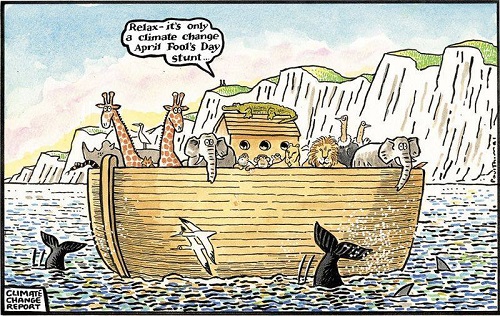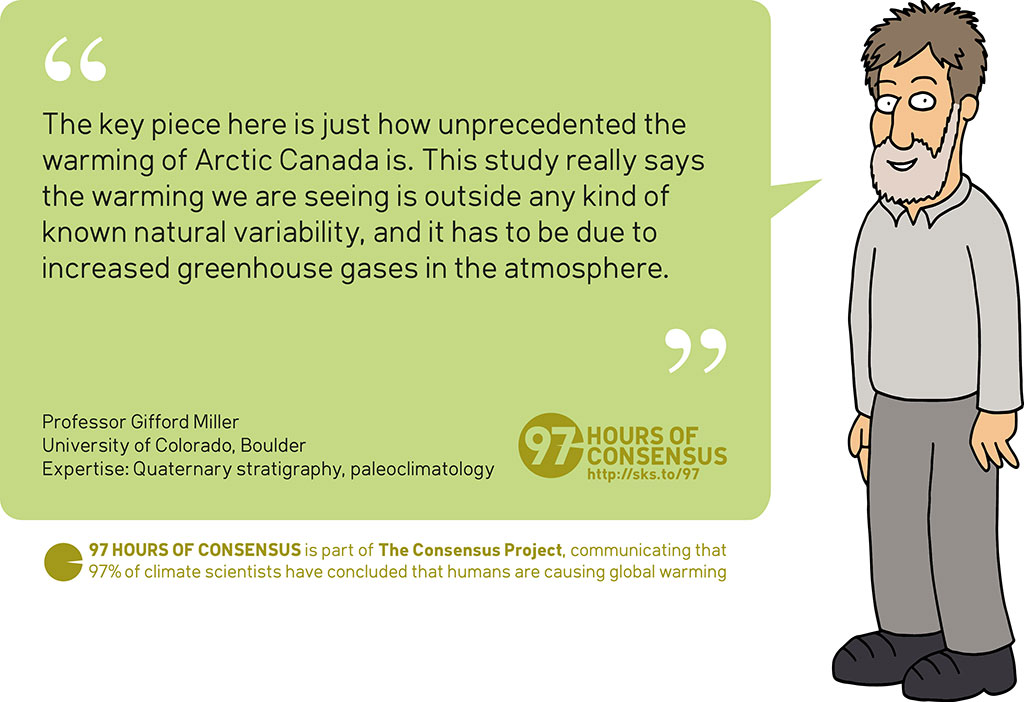2018 SkS Weekly Climate Change & Global Warming Digest #13
Posted on 1 April 2018 by John Hartz
Story of the Week... Editorial of the Week... Toon of the Week... SkS in the News... Photo of the Week... SkS Spotlights... Video of the Week... Coming Soon on SkS... Poster of the Week... SkS Week in Review... 97 Hours of Consensus...
Story of the Week...
Biggest Threat to Humanity? Climate Change, U.N. Chief Says

António Guterres, the United Nations secretary general, said, “I am beginning to wonder how many more alarm bells must go off."CreditGiuseppe Lami/European Pressphoto Agency, via Shutterstock.
UNITED NATIONS — Nuclear weapons? Famine? Civil war? Nope.
The United Nations secretary general, António Guterres, on Thursday called climate change “the most systemic threat to humankind” and urged world leaders to curb their countries’ greenhouse gas emissions.
He didn’t say much, though, about the one world leader who had pulled out of the landmark United Nations climate change agreement: President Trump.
Instead, Mr. Guterres suggested that Mr. Trump’s withdrawal from the Paris accord nearly a year ago didn’t matter much. The American people, he said, were doing plenty.
“Independently of the position of the administration, the U.S. might be able to meet the commitments made in Paris as a country,” the secretary general said. “And, as you know, all around the world, the role of governments is less and less relevant.”
Biggest Threat to Humanity? Climate Change, U.N. Chief Says by Somini Sengupta, Climate, New York Times, Mar 29, 2018
Editorial of the Week...
Trump distracts America from the task of facing three existential threats
As Trump forces America’s attention span to shrink, we are unable to address the threats that could fundamentally endanger American national security

‘The seas are rising, imperiling hundreds of millions of people in coastal communities from Shanghai to Miami.’ Photograph: Alain Jocard/AFP/Getty Images
Donald Trump’s daily assaults on American democracy and the pillars of America’s role in the world are disastrous – and they are also distracting America from even bigger global challenges. At just the moment when the United States must be joining together with the rest of the world to confront three existential threats – climate change, challenges to democracy, and the rise of China – Americans are forced to spend every waking minute mitigating Trump’s damage.
In Trump’s America, it’s hard to keep up. The news and controversies come so quickly they eat into each other’s news cycles. Actions by the Trump administration that previously might have brought down a presidency (or at least merited a congressional inquiry) pass in a matter of hours as the next jaw-dropping scandal explodes.
As Trump forces America’s attention span to shrink (was that even possible?), we are unable to address the three threats that could fundamentally endanger American national security.
First, climate change. It’s hard to overstate the magnitude of this threat. The seas are rising, imperiling hundreds of millions of people in coastal communities from Shanghai to Miami. Climate change is likely enhancing the devastation of extreme weather like storms and heatwaves.
Unless national and global actions are taken, the World Bank estimates that by 2050, more than 140 million people in Latin America, sub-Saharan Africa, and South Asia will be forced to leave their homes because of climate change. The near to mid-term effects of the heating planet could affect hundreds of millions. The long-term effects could wipe out humanity.
Preventing the worst effects of climate change and reversing its course would require a global effort the likes of which we’ve only seen in the movie Independence Day, in which the countries of the world put aside their disagreements to fight an alien invasion threatening all of humankind. That’s how difficult this would be in normal circumstances.
But in Donald Trump’s world, we are moving backwards, from announcing the intention to withdraw the United States from the Paris climate agreement to gutting the federal government’s role as a defender of the environment.
The necessary efforts of actors like the US Climate Alliance to encourage US states to continue the transition away from dirty fuels can only do so much in the absence of presidential leadership. And America has vacated the global effort – and abandoned its leadership role – to forge solutions.
Trump distracts America from the task of facing three existential threats, Opinion by Michael H Fuchs, Guardian, Mar 30, 2018
Toon of the Week...

Hat tip to Stop Climate Science Denial.
SkS in the News...
In his article, About half of Americans don’t think climate change will affect them — here’s why (The Verge), Alessandra Potenza writes:
But temperatures are going up everywhere, not just in the Arctic; cities are especially hard-hit and heat waves are becoming more frequent. Extreme weather events — like wildfires and hurricanes — are also becoming more extreme. These changes are consistent with a warming world, scientists say. That sort of makes sense: though the Gallup poll found that while only 64 percent of Americans think that global warming is caused by human activities, 97 percent of climate scientists believe that.
The final link embedded in the above paragraph is to: Consensus on consensus: a synthesis of consensus estimates on human-caused global warming, Cook et al, , ,
In his article, Darren Aronofsky’s New TV Series Breaks With The Hollywood Playbook On Climate Change (HuffPost), Alexandar C Kaufman quotes John Cook:
“Film has a huge role to play in climate communication,” John Cook, a researcher at George Mason University’s Center for Climate Change Communication, told HuffPost. “Science can communicate facts, but unfortunately, that only gets us so far. We need art to shape the facts of climate change in narratives and frames that resonate with the general public.”
SkS Spotlights...

The Environmental Data & Governance Initiative (EDGI) is an international network of academics and non-profits addressing potential threats to federal environmental and energy policy, and to the scientific research infrastructure built to investigate, inform, and enforce them. Dismantling this infrastructure — which ranges from databases to satellites to models for climate, air, and water — could imperil the public's right to know, the United States' standing as a scientific leader, corporate accountability, and environmental protection.
In response, EDGI is building online tools, events, and research networks to proactively archive public environmental data and ensure its continued public availability. We also are monitoring changes to federal regulation, enforcement, research, funding, websites and general agency management at agencies including EPA, DOE, NASA, NOAA, and OSHA. We aim to serve the environmental community and its allies, and to enable them to hold the new administration accountable, by preserving and improving public access to at-risk government environmental data, documents, and digital interfaces, and by monitoring, documenting, and analyzing change to federal environmental agencies. We also aim to create an open, collaborative network of individuals, non-profits, universities and companies who believe that science and data are vital for environmental governance.
Video of the Week...
The Sun, TSI, Maunder Minimum & Little Ice Age: Prof Michael Lockwood
Coming Soon on SkS...
- Our leaders need to learn not everything is zero sum (Joe Robertson)
- New resource: The Fact-Myth-Fallacy slide-deck (Baerbel, JG)
- American conservative are still clueless about the 97% expert climate consensus (Dana)
- Climate denial explained Part 1 (qwertle)
- New research this week (Ari)
- 2018 SkS Weekly Climate Change & Global Warming News Roundup #14 (John Hartz)
- 2018 SkS Weekly Climate Change & Global Warming Digest #14 (John Hartz)
Poster of the Week...

SkS Week in Review...
- 2018 SkS Weekly Climate Change & Global Warming News Roundup #13 by John Hartz
- New research, March 19-25, 2018 by Ari Jokimäki
- Climate scientists debate a flaw in the Paris climate agreement by Dana Nuccitelli (Climate Conensus - the 97%, Guardian)
- How could global warming accelerate if CO2 is 'logarithmic'? by DPiepgrass
- Students from KMIDS college in Bangkok posting comments by BaerbelW
- In court, Big Oil rejected climate denial by Dana Nuccitelli (Climate Conensus - the 97%, Guardian)
- Study: wind and solar can power most of the United States by John Abraham (Climate Conensus - the 97%, Guardian)
- 2018 SkS Weekly Climate Change & Global Warming Digest #12 by John Hartz
97 Hours of Consensus...
































 Arguments
Arguments






























The largest threat to humanity is indeed climate change, because of the level of damage, the range of different effects, and the millenia level time scales and impacts on multiple generations. In comparison, difficult authoritarian leaders are more temporary aberrations although still very troubling.
Trump has indeed badly handled climate change along with almost everything else, and is distracting attention from the three real existential level threats. The english language simply doesn't have adequate words to describe the situation.
Surely we also need to be considering other environmental threats, resource scarcity issues and growing inequality and job insecurity in western nations.
I'm not sure about the alleged existential level threat of China. While China is a dictatorship and this is not ideal, it is relatively benign, and imho the economic threats can be contained with sensible responses by the world more forcefully pushing fair free trade rules in China, etcetera, but this absolutely shouldn't include punative tariffs like Trump is doing. There have to be smarter and less mutually destructive ways than that. But the world cant do nothing either, because China is simply developing in ways that do pose some threats, well analysed on the economist.com.
I agree threats to democracy are existential, although the issue is not so much democracy itself as a means of electing governments. It is more the threat posed by democratically elected authoritarian leaders, and the mindset that is doing this.
Many of the current authoritarian leaders seem to currently share the following attributes. They denigrate scientists and public servants in government, denigrate minority groups and scapegoat them for no good reason, they spread unfounded fears of immigration and free trade. Some of these authoritarian leaders promote reckless corporate and personal economic behaviour that is short sighted, and pushes costs onto future generations.
Unfortunately this combination of factors with many of these authoritarian leaders is by its nature toxic to efforts to deal with climate change, so reinforces this existential threat. So the existential threat against democracy posed by excessive authoritarianism and anti science thinking is a huge problem.
nigelj: Fuch's opines about "three threats that could fundamentally endanger American national security". Your comment seems to address more global issues.
John Hartz, my comments basically do apply to America, but I think China affects other countries in a similar way, and the trump issue is similar to other authoritarian leaders.
I should have been clearer. I got the more global story of the week and the editorial on america confused in my head.